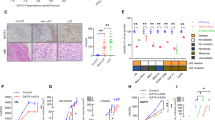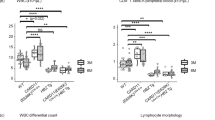Abstract
The gfi-1 gene encodes a zinc finger containing protein that is specifically expressed in T-lymphocytes and is a frequent target of proviral insertion in T-cell lymphoma provoked by infection with MoMuLV–a non acute transforming retrovirus. Expression of a gfi-1 transgene targeted to T-cells by the lck proximal promoter provokes a reduction of peripheral CD4 and CD8 positive T-cells but nevertheless weakly predisposes transgenic animals for the development of T-cell lymphoma. Forced coexpression of the serine/threonine kinase Pim-1 can partially restore normal T-cell numbers in double pim-1/gfi-1 transgenic mice. Moreover, the combinatorial expression of Pim-1 and Gfi-1 leads to accelerated development of T-cell lymphoma with a mean latency period of 114 days. A similar accelerated rate of lymphoma development was observed when lck-gfi-1 mice were crossed with mice that carry a L-myc gene targeted to be expressed at high levels in T-cells. The results show that gfi-1 can act with low activity as a dominant oncogene when overexpressed but also demonstrate that it is most efficient only in the presence of a cooperative partner protein as for example Pim-1 or L-Myc. In addition, the results suggest that Pim-1 and Gfi-1 are acting synergistically in both T-cell lymphomagenesis and T-cell development.
This is a preview of subscription content, access via your institution
Access options
Subscribe to this journal
Receive 50 print issues and online access
$259.00 per year
only $5.18 per issue
Buy this article
- Purchase on Springer Link
- Instant access to full article PDF
Prices may be subject to local taxes which are calculated during checkout
Similar content being viewed by others
Author information
Authors and Affiliations
Rights and permissions
About this article
Cite this article
Schmidt, T., Karsunky, H., Gau, E. et al. Zinc finger protein GFI-1 has low oncogenic potential but cooperates strongly with pim and myc genes in T-cell lymphomagenesis. Oncogene 17, 2661–2667 (1998). https://doi.org/10.1038/sj.onc.1202191
Received:
Revised:
Accepted:
Published:
Issue Date:
DOI: https://doi.org/10.1038/sj.onc.1202191
Keywords
This article is cited by
-
Gfi1 upregulates c-Myc expression and promotes c-Myc-driven cell proliferation
Scientific Reports (2020)
-
Reduced expression but not deficiency of GFI1 causes a fatal myeloproliferative disease in mice
Leukemia (2019)
-
Prognostic significance of high GFI1 expression in AML of normal karyotype and its association with a FLT3-ITD signature
Scientific Reports (2017)
-
The MYB proto-oncogene suppresses monocytic differentiation of acute myeloid leukemia cells via transcriptional activation of its target gene GFI1
Oncogene (2014)
-
Pim-selective inhibitor DHPCC-9 reveals Pim kinases as potent stimulators of cancer cell migration and invasion
Molecular Cancer (2010)



